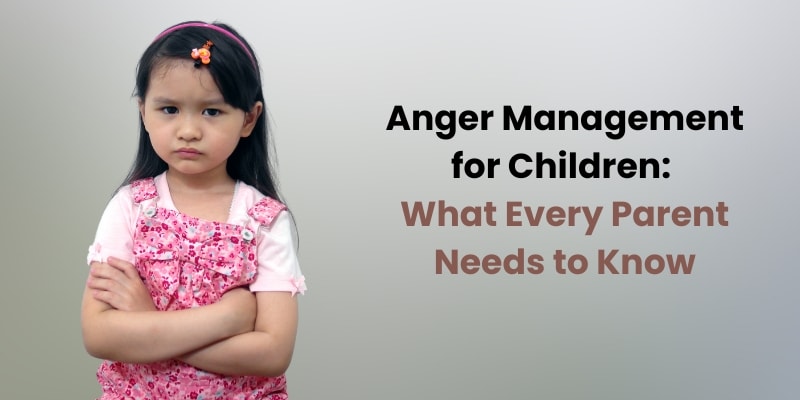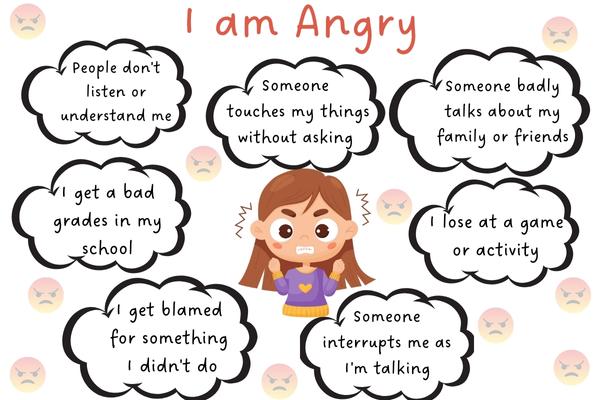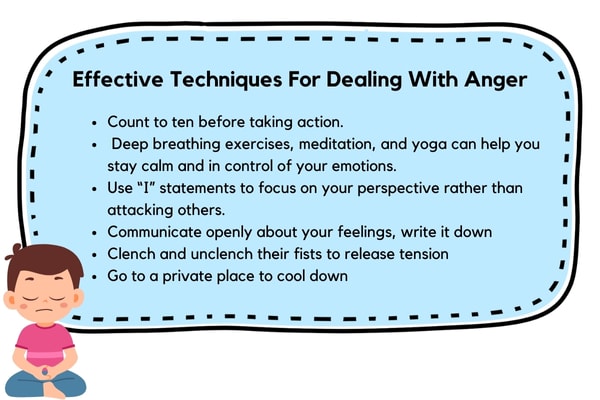“Kids don’t know how to handle frustration and disappointment, so they get mad. And it doesn’t help when we tell our kids to just calm down and have a better attitude.” – Trisha Goyer.
Understand Why Children Get Angry
Understanding why your kid (small child) or children have explosive, angry, and disruptive behaviour can be challenging on the parenting to-do list. But, despite being difficult, it’s a must for parents because the only way to help an angry kid calm their anger is by understanding the source of their anger.
Anger problems in children usually happen because they don’t know how to cope with the uncomfortable feeling or frustration they are experiencing. They still need to learn coping skills for solving problems without getting angry.
However, anger in children can also be caused by other problems that can be treated. According to child mind institute, if your kids continue to experience regular emotional outbursts (or feelings of anger), then it’s often a symptom of distress, and some of the possible underlying reasons include:
ADHD:
- A lot of kids with ADHD, especially the ones experiencing hyperactivity and impulsivity, have trouble controlling their behaviour. As a result, they find it difficult to switch from one activity to another or comply with instructions, making them appear angry or defiant.
- Their inability to complete tasks and focus can lead to power struggles, arguing, and tantrums. ADHD is a serious issue in kids, and it’s often overlooked—sometimes even ignored in children with a history of severe aggression—simply because there are more significant issues.
Anxiety:
- Kids who appear defiant and angry usually have severe and unrecognized anxiety.
- If your child or children has anxiety, especially if they are trying to hide it, they may find it challenging to cope with distressing situations and lash out when demands at school pressure them that they can’t handle.
- In a child’s anxiety-inducing situation, their “fight or flight” can become active, and as a result, they may throw a tantrum or refuse to do something to avoid the source of acute fear.
Trauma or emotional neglect:
- Aggressive behaviour or acting out in school could result from emotional neglect, trauma, or chaos at home.
- According to Nancy Rappaport, MD, a Harvard Medical School professor specializing in mental health in a school setting, “Kids who are struggling, not feeling safe at home can act like terrorists at school, with fairly intimidating kinds of behaviour.”
- Children usually at risk are those with ADHD who have also experienced trauma.
Learning problems:
- If your kid acts out repeatedly during homework or school, they may have an undiagnosed learning disorder.
- For example, if they have many maths problems, it may make them irritable and frustrated. Instead of seeking help, they may rip off an assignment or start something with another child to escape the real issue.
Sensory processing issues:
- Some kids have trouble processing the sensory information they receive from the world around them.
- Suppose your kid is under-sensitive or oversensitive to stimulation. In that case, things like too much noise or light and scratchy clothes could make them uncomfortable, distracted, anxious, or overwhelmed, leading to meltdowns.
Autism:
- Kids with the autism spectrum are usually prone to dramatic meltdowns.
- If your kid is on the spectrum, then they may tend to be rigid (require a consistent routine to feel safe), and an unexpected change could easily set them off.
- They may have sensory problems that could cause them to be overwhelmed by stimulation, causing a meltdown that’ll continue until they get exhausted.
- In addition, they may also need more communication skills to express what they need or want.
Listen to Your Child Talk About Their Anger
In previous generations, listening to your kids wasn’t a common practice. Because of that, learning to listen to your child’s emotions (in this case, anger) can sometimes feel uncomfortable, foreign, and even excruciating.
Sitting comfortably with your child’s feelings requires a lot of practice. In heated moments, it usually takes a lot of forgiveness and self-compassion to remain calm, but you may not always have the capacity to listen.
However, if parents can learn to feel their emotions, they can build the capacity to listen to their children.
Anytime you notice your kid is angry or upset, see it as an opportunity to connect. You can say things similar to, “I can see that you are angry. Can you tell me what’s making you upset?” and in times when you know the reason for their anger, then you can say something like, “I can see that you are angry because you love playing at the park and we have to leave the park.” Saying things like that will help them open up their feelings to you.
Next, you accept your child’s anger. Then, you can tell your child that it’s okay for them to feel angry. This is important because you want your child to think they and their emotions are okay. You don’t want them to believe that they have to hide their feelings.
Finally, please encourage them to use words. Why is this important? It’s important because kids naturally don’t know the words to use, so you must teach them this social skill. For example, you can tell your kid: “when you are angry, I want to hear what’s upsetting you.” If you use words, I’ll be able to understand better and help you.
Be a Good Role Model for How to Handle Frustration and Anger
You can teach your kids to recognize anger management for children as an essential skill to possess. While teaching your kids that, you should also be aware of the fact that it takes a lot of work to do.
Managing anger takes some people a lifetime to deal with, and it remains a work in progress. Headlines on the news daily show us how hard it is even for adults to learn conflict resolution.
Your kids will learn how to handle anger and other emotions they may experience by watching your grown-up ways of handling such emotions. Hence, becoming a good role model for them to emulate when it comes to dealing with anger. You can do this by letting your children know when you are angry with them for something they have done. Doing this will teach them the consequences of their actions.
When you are angry with others, you can show them how to recognize their feelings, stop lashing out impulsively, and look for constructive solutions. If, as a parent, you fail at your attempts to defuse your own anger, then you should admit your mistake and show humility.
Teach Problem-Solving Skills for Dealing with Anger Triggers
First, you must teach your child how to identify the source of their anger. They can do this by asking questions like “why am I upset?” Once they can answer the question, then you can offer them these helpful strategies to help calm or cool off their anger:
- Count to ten before taking action.
- Deep breathing exercises, meditation, and yoga can help you stay calm and in control of your emotions.
- Use “I” statements to focus on your perspective rather than attacking others.
- Communicate openly about your feelings, write it down.
- Clench and unclench their fists to release tension.
- Go to a private place to cool down.
As a parent or guardian, if you notice the early signs of anger in your kids, you should let them know and allow them to try out the anger management strategies you have taught them.
However, if you notice that your child does a lot of lashing out—so much that it frightens you and disrupts your family—then it might be time to seek professional help (you can hire the services of a child psychologist). Many good behaviour therapies can help an aggressive child get past aggression, relieve stress, and improve relationships.
Some of these therapies include:
Parent-child interaction therapy:
- PCIT is helpful to kids who fall between the ages of 2 and 7.
- In this therapy, the parent and child work together through a set of exercises while the therapist instructs or coaches the parent via an earbud.
- This therapy teaches you to pay more attention to your child’s positive behaviour, provide consistent consequences for negative and aggressive behaviour, and ignore minor misbehaviours, all while remaining calm.
Parent Management Training:
- PMT teaches a similar technique as PCIT. The difference here is that the therapist only works with the parents, not the child.
Collaborative and proactive solutions:
- CPS is a program based on the idea that disruptive or explosive behaviour results from lagging skills rather than, for example, an attempt to test limits or get attention.
- The idea here is to teach children the skills they need to react to a situation in a more appropriate behaviour rather than throwing a tantrum.
Create an Open Environment for Discussing Emotions and Feelings
Changing the environment or scenery is an excellent way to deal with anger (even for adults). If you notice that your child is angry about something, take them to an open environment (one without the source of anger) where they can be free or open to discussing their emotions or feelings with you.
You can start the discussion by saying, “I saw you clenching your fists; I wonder if you are angry?” Doing this helps your kid identify what’s making them upset and helps them open up to you.
And if, after talking with them and you notice that they are still angry, then you can practice the anger management strategies above with them to help them calm down. For example, you count to 10 with them or perform deep, slow breathing exercises with them.
Takeaway
When your kid or kids get upset or start throwing tantrums, the experience is often stressful and can sometimes be scary for parents and guardians.
Despite that, there are several ways to help your kid identify reasons for their aggressive behaviour (or anger) and learn how to control their emotions better.
However, if you have tried the anger management tips found in this blog with your kids and it doesn’t seem to work, or the effect is minimal, then you might find it helpful to seek help from a therapist or let your child attend a support group.
Reference
- Calming Angry Kids Quotes – https://www.goodreads.com/work/quotes/61651624-calming-angry-kids-help-and-hope-for-parents-in-the-whirlwind
- Helping your child with anger issues – https://www.nhs.uk/mental-health/children-and-young-adults/advice-for-parents/help-your-child-with-anger-issues/
- 6 Effective Ways to Help Your Child Manage Their Anger Without Losing Your Patience – https://www.parents.com/6-ways-to-help-your-child-manage-their-anger-11694923https://childmind.org/article/angry-kids-dealing-with-explosive-behavior/
- Angry Kids: Dealing With Explosive Behavior – https://childmind.org/article/angry-kids-dealing-with-explosive-behavior/
- Is My Child’s Anger Normal? – https://childmind.org/article/is-my-childs-anger-normal/











